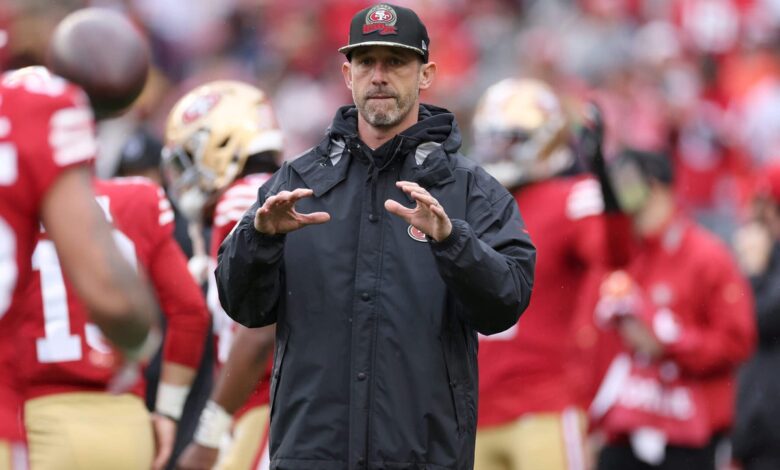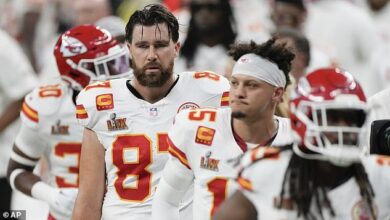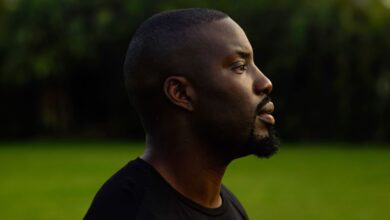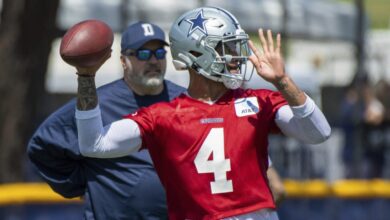Kawakami: How Kyle Shanahan’s coaching barbs motivate and elevate the 49ers

SANTA CLARA, Calif. — Imagine that you’re Nick Bosa in early December, minding your own business while Kyle Shanahan conducts the usual Saturday night team meeting before the 49ers’ game the next day against Miami. You’re not just having a good season to this point, you’re having a great season — you’ve got 11.5 sacks in 10 games played and just were named league Defensive Player of the Month for November — and your team is on a four-game winning streak.
Things aren’t perfect, but they aren’t too bad, either. Then, bam: Shanahan compliments the way the 49ers’ linebackers have been playing and adds that it’s clearly better than how the Defensive Player of the Month and the rest of the defensive linemen have been performing.
“Hopefully you guys can change that tomorrow,” Shanahan said, looking at the D-linemen, maybe Bosa in particular.
The result: The next day, Bosa almost single-handedly destroyed the Dolphins’ offense with three sacks and a forced fumble that helped seal the game in an eventual 33-17 victory and then ran over to Shanahan to acknowledge the motivation and give a little bit back to the coach who got him revved up.
Big-picture result: The 49ers are now on an 11-game winning streak that includes last Saturday’s wild-card victory over Seattle and will host the Cowboys on Sunday at Levi’s Stadium for a berth in the NFC Championship Game.
The Shanahan darts will keep coming. It wouldn’t be the 49ers if they stopped.
“He does a lot of things,” Bosa said on Wednesday. “He’s very deliberate on his preparation for the week and whether it’s challenging certain guys, he does anything that he thinks will give us an edge or give the team an advantage.”
Did you say anything in response to Shanahan that night?
“It was during a team meeting,” Bosa said with a smile. “I’m not going to say anything back to Kyle then.”
But Bosa answered on the field, which was exactly what Shanahan wanted. It’s the kind of poking and prodding that Shanahan does every day, all day with his players. He praises them, for sure. He shows the tape of all the great plays. He roars with them after victories. He suffers with them after defeats. But the heart of the 49ers’ coach-player dynamic is the bouncy back-and-forth that Shanahan conducts with every player one-on-one and with his best players, often in front of the rest of the team.
“We just kind of expect it at this point,” Kyle Juszczyk said with a smile. “He always says he kind of struggles with compliments. So even when he does compliment you, there’s normally something else coming with it. …
“I think that’s part of our culture, that nobody’s too big for coaching. Kind of keeps everyone humble and motivated and grounded.”
Trent Williams calls it a check-your-pride-at-the-door situation. Juszczyk says he gets a Shanahan barb every week and has been with Shanahan long enough to fire back a wry response most times. We all know that Shanahan can be very, very tough on his quarterbacks.
And Jimmie Ward, another long-time 49ers veteran, says the best, most experienced players understand that they’re going to hear it the most because they have the most responsibility. It’s a grin-and-bear-it meritocracy in the 49ers’ locker room.
“You’ve gotta point out the players who get paid the most, the players who are supposedly the superstars,” Ward said. “Because if you’re only getting on (certain) players and you’re not getting on (stars), you’re going to lose respect. It’s all about being a good coach.
“I’ve seen former coaches not talk to superstars (in meetings). I don’t know if that was a good thing. Could’ve been a bad thing. I think they do a good job of calling people out who make mistakes. That’s a good thing.”
Most of the tart commentary comes in that final team meeting on the eve of the game. That’s when Shanahan gives the team a description of what he wants to see in the upcoming game. In the past, that’s when he told his players he wanted to run it at least 30 times in the Vikings playoff matchup in January 2020 (and proceeded to run it 47 times in the easy victory).
But the Saturday night meeting at the team hotel is also when Shanahan tells the players what he absolutely doesn’t want to happen. From what I can tell, the other coaches don’t know when or where Shanahan might direct his most piercing points, and that’s wholly fitting for the context of the way this team operates. Planned or improvised, this is Shanahan’s show.
“I think most of it just happens,” Shanahan said Wednesday. “I think maybe how you do it can sometimes get a reaction from people. It’s very simple with me because it all just goes off of what I see on tape. And I’m pretty consistent with that. If I see something good or bad, I just start coaching, so it depends who’s in the room.”
Shanahan, of course, spends most of his time during the week with the offense, which, Juszczyk points out, means the offensive players get much more of the coach’s commentary than the defensive players. But the goal is always to fix mistakes, avoid complacency and maybe motivate a player or two in a very specific way.
“We’ve won a lot of games in a row and done some good things, and I think it’s easy to look over things,” Shanahan said. “But your goal isn’t just to win those games. Your goal is to be the last team standing and you have to get better each week at that. And sometimes human nature, when you’ve won so many games in a row, people stop looking at how to get better. They think they’ve arrived, and you need to show them on the tape and you need to speak it because players aren’t always seeing it that way.
“They watch their assignment, what they’re doing, but they don’t always see the big picture. And it’s our job to show them what they need to do to carry out their job at the highest level. And I want every single person to play to the top of their ability, and nobody’s perfect, so I’m always striving to get guys to play better.”
What happens in the room when he singles out a player? Shanahan grinned when he talked about the dynamic.
“When you don’t get talked about much in front of the whole team, and (then the player is mentioned), it’s crazy,” Shanahan said. “You have a lot of grown men (who) hear their name in a big room and they get really nervous, which is crazy. They talk nonstop and then you ask them to break down the team one day and it’s just, like, crickets. I think it’s good practice for everybody to be in those situations.”
When asked recently about Shanahan’s coaching style, John Lynch laughed and launched into a story from his Hall of Fame playing days as a safety with the Buccaneers.
“Herm Edwards leaves (the Buccaneers in January 2001) to be head coach for the New York Jets,” Lynch said of his old position coach. “Well, that’s a tall order to replace him. I’m in the prime of my career, Ronde Barber’s playing really good football. And they bring in a guy from college football, Mike Tomlin. He had just been (at the University of Cincinnati). And the first thing Mike did, he handed me, back then it was all VHS, and there were 70 plays and there was a paragraph on legal pad that corresponded with every play. It was basically, ‘Here’s 70 plays I’ve identified where you could be better.’ First, I was a little put-off. But then I read it and I read the detail, ‘Man, this guy could help me get better.’
“That’s all you want is to continue to be coached. Because sometimes what happens when you’re accomplished, sometimes coaches will leave you alone. Well, I tell that story just to say that Kyle will coach every player on this team. He’s always just going to be real. He’ll praise them as well. We get a great kick out of watching Trent Williams block people — as we say, ‘throw him out of the club’ and all those things. But he’s not afraid to point out when we expect their effort to be better. I think the players on our team love that.”
Asked whether he’d borne the brunt of some Shanahan coaching, Arik Armstead shrugged and shook his head at the idea of making a big deal of this.
“It’s really not like that, it’s nothing crazy,” Armstead said. “Throws little jabs every now and then that are motivating. At the end of the day, he knows you’re a good player and he’s motivating … he’s praising you and motivating you to reach new heights.”
When I was asking Shanahan about his strategy with these kinds of motivational nudges, the look on his face as he answered told me one clear thing: He almost certainly has a few more ready to go for this weekend and a few more weekends after that if the 49ers get there. If he didn’t do it, the rhythm and mood would be off.
It’s sort of like the old saying: If he’s making fun of you, he likes you; if he’s ignoring you, that’s worse. But the Shanahan spin to that is: If he’s talking about you, he also wants you to play a little better. And he wants you to answer him in shouts and celebrations during the game and after a victory.
GO DEEPER
Christian McCaffrey’s Steph Curry-like gravity is like magic for the 49ers’ offense
(Photo: Ezra Shaw / Getty Images)
Source link



